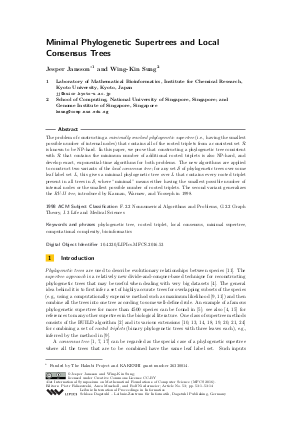Minimal Phylogenetic Supertrees and Local Consensus Trees
Authors Jesper Jansson, Wing-Kin Sung
-
Part of:
Volume:
41st International Symposium on Mathematical Foundations of Computer Science (MFCS 2016)
Part of: Series: Leibniz International Proceedings in Informatics (LIPIcs)
Part of: Conference: Mathematical Foundations of Computer Science (MFCS) - License:
 Creative Commons Attribution 3.0 Unported license
Creative Commons Attribution 3.0 Unported license
- Publication Date: 2016-08-19
File

PDF
LIPIcs.MFCS.2016.53.pdf
- Filesize: 0.57 MB
- 14 pages
Document Identifiers
Subject Classification
Keywords
- phylogenetic tree
- rooted triplet
- local consensus
- minimal supertree
- computational complexity
- bioinformatics
Metrics
- Access Statistics
-
Total Accesses (updated on a weekly basis)
0PDF Downloads0Metadata Views
Abstract
The problem of constructing a minimally resolved phylogenetic supertree (i.e., having the smallest possible number of internal nodes) that contains all of the rooted triplets from a consistent set R is known to be NP-hard. In this paper, we prove that constructing a phylogenetic tree consistent with R that contains the minimum number of additional rooted triplets is also NP-hard, and develop exact, exponential-time algorithms for both problems. The new algorithms are applied to construct two variants of the local consensus tree; for any set S of phylogenetic trees over some leaf label set L, this gives a minimal phylogenetic tree over L that contains every rooted triplet present in all trees in S, where ``minimal'' means either having the smallest possible number of internal nodes or the smallest possible number of rooted triplets. The second variant generalizes the RV-II tree, introduced by Kannan, Warnow, and Yooseph in 1998.
Cite As Get BibTex
Jesper Jansson and Wing-Kin Sung. Minimal Phylogenetic Supertrees and Local Consensus Trees. In 41st International Symposium on Mathematical Foundations of Computer Science (MFCS 2016). Leibniz International Proceedings in Informatics (LIPIcs), Volume 58, pp. 53:1-53:14, Schloss Dagstuhl – Leibniz-Zentrum für Informatik (2016)
https://doi.org/10.4230/LIPIcs.MFCS.2016.53
BibTex
@InProceedings{jansson_et_al:LIPIcs.MFCS.2016.53,
author = {Jansson, Jesper and Sung, Wing-Kin},
title = {{Minimal Phylogenetic Supertrees and Local Consensus Trees}},
booktitle = {41st International Symposium on Mathematical Foundations of Computer Science (MFCS 2016)},
pages = {53:1--53:14},
series = {Leibniz International Proceedings in Informatics (LIPIcs)},
ISBN = {978-3-95977-016-3},
ISSN = {1868-8969},
year = {2016},
volume = {58},
editor = {Faliszewski, Piotr and Muscholl, Anca and Niedermeier, Rolf},
publisher = {Schloss Dagstuhl -- Leibniz-Zentrum f{\"u}r Informatik},
address = {Dagstuhl, Germany},
URL = {https://drops.dagstuhl.de/entities/document/10.4230/LIPIcs.MFCS.2016.53},
URN = {urn:nbn:de:0030-drops-64653},
doi = {10.4230/LIPIcs.MFCS.2016.53},
annote = {Keywords: phylogenetic tree, rooted triplet, local consensus, minimal supertree, computational complexity, bioinformatics}
}
Author Details
References
-
E. N. Adams III. Consensus techniques and the comparison of taxonomic trees. Systematic Zoology, 21(4):390-397, 1972.

-
A. V. Aho, Y. Sagiv, T. G. Szymanski, and J. D. Ullman. Inferring a tree from lowest common ancestors with an application to the optimization of relational expressions. SIAM Journal on Computing, 10(3):405-421, 1981.

-
M. A. Bender and M. Farach-Colton. The LCA problem revisited. In Proceedings of the 4^th Latin American Symposium on Theoretical Informatics (LATIN 2000), volume 1776 of LNCS, pages 88-94. Springer-Verlag, 2000.

-
O. R. P. Bininda-Emonds. The evolution of supertrees. TRENDS in Ecology and Evolution, 19(6):315-322, 2004.

-
O. R. P. Bininda-Emonds, M. Cardillo, K. E. Jones, R. D. E. MacPhee, R. M. D. Beck, R. Grenyer, S. A. Price, R. A. Vos, J. L. Gittleman, and A. Purvis. The delayed rise of present-day mammals. Nature, 446(7135):507-512, 2007.

-
D. Bryant. Building Trees, Hunting for Trees, and Comparing Trees: Theory and Methods in Phylogenetic Analysis. PhD thesis, University of Canterbury, Christchurch, New Zealand, 1997.

-
D. Bryant. A classification of consensus methods for phylogenetics. In M. F. Janowitz, F.-J. Lapointe, F. R. McMorris, B. Mirkin, and F. S. Roberts, editors, Bioconsensus, volume 61 of DIMACS Series in Discrete Mathematics and Theoretical Computer Science, pages 163-184. American Mathematical Society, 2003.

-
J. Byrka, S. Guillemot, and J. Jansson. New results on optimizing rooted triplets consistency. Discrete Applied Mathematics, 158(11):1136-1147, 2010.

-
B. Chor, M. Hendy, and D. Penny. Analytic solutions for three taxon ML trees with variable rates across sites. Discrete Applied Mathematics, 155(6-7):750-758, 2007.

-
M. Constantinescu and D. Sankoff. An efficient algorithm for supertrees. Journal of Classification, 12(1):101-112, 1995.

-
J. Felsenstein. Inferring Phylogenies. Sinauer Associates, Inc., Sunderland, Massachusetts, 2004.

-
M. Garey and D. Johnson. Computers and Intractability - A Guide to the Theory of NP-Completeness. W. H. Freeman and Company, New York, 1979.

-
L. Ga̧sieniec, J. Jansson, A. Lingas, and A. Östlin. On the complexity of constructing evolutionary trees. Journal of Combinatorial Optimization, 3(2-3):183-197, 1999.

-
Y. J. He, T. N. D. Huynh, J. Jansson, and W.-K. Sung. Inferring phylogenetic relationships avoiding forbidden rooted triplets. Journal of Bioinformatics and Computational Biology, 4(1):59-74, 2006.

-
M. R. Henzinger, V. King, and T. Warnow. Constructing a tree from homeomorphic subtrees, with applications to computational evolutionary biology. Algorithmica, 24(1):1-13, 1999.

-
J. Jansson, R. S. Lemence, and A. Lingas. The complexity of inferring a minimally resolved phylogenetic supertree. SIAM Journal on Computing, 41(1):272-291, 2012.

-
S. Kannan, T. Warnow, and S. Yooseph. Computing the local consensus of trees. SIAM Journal on Computing, 27(6):1695-1724, 1998.

-
M. P. Ng and N. C. Wormald. Reconstruction of rooted trees from subtrees. Discrete Applied Mathematics, 69(1-2):19-31, 1996.

-
C. Semple. Reconstructing minimal rooted trees. Discrete Applied Mathematics, 127(3):489-503, 2003.

-
C. Semple, P. Daniel, W. Hordijk, R. D. M. Page, and M. Steel. Supertree algorithms for ancestral divergence dates and nested taxa. Bioinformatics, 20(15):2355-2360, 2004.

-
S. Snir and S. Rao. Using Max Cut to enhance rooted trees consistency. IEEE/ACM Transactions on Computational Biology and Bioinformatics, 3(4):323-333, 2006.

-
M. Steel. The complexity of reconstructing trees from qualitative characters and subtrees. Journal of Classification, 9(1):91-116, 1992.

-
W.-K. Sung. Algorithms in Bioinformatics: A Practical Introduction. Chapman &Hall/CRC, Boca Raton, Florida, 2010.

-
S. J. Willson. Constructing rooted supertrees using distances. Bulletin of Mathematical Biology, 66(6):1755-1783, 2004.

-
C. Wulff-Nilsen. Faster deterministic fully-dynamic graph connectivity. In Proceedings of the 24^th Annual ACM-SIAM Symposium on Discrete Algorithms (SODA 2013), pages 1757-1769. SIAM, 2013.

